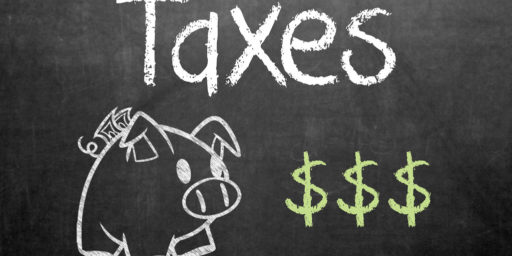Reduce Taxes to Reduce the Deficit?
I have to agree with Mark Thoma that this argument is highly suspect (well Mark simply says suspect, not highly suspect). Mark points to this quote from a Bloomberg article,
President George W. Bush urged Congress to make permanent the tax cuts enacted during his first term and draft legislation to bolster the Social Security program, after the lawmakers return from their August break. “The tax relief stimulated economic vitality and growth and it has helped increase revenues to the Treasury,” Bush said in his weekly radio address. “The increased revenues and our spending restraint have led to good progress in reducing the federal deficit.”…
In looking at the data presented by Jim Hamilton, it doesn’t look good for this claim. While the idea of reducing tax rates can increase tax revenue is theoretically possible it just hasn’t happened all that often. Further, Bush’s track record in regards to controlling/reducing spending is…shall we say goddamned freaking awful (and that is being polite)?
Is there a reason to make the tax cuts permanent? Maybe, but the idea of reducing the deficit is just not one of them. I’d like to see tax rates lower because I’d also like to see the government doing less (i.e. cut spending). But given what we have seen from Bush this is just not going to happen.





Worked in the early 80’s. Well it worked for Tax Revenue anyway. Tax Cuts can’t seem to stop Congressional Pork, though.
Total receipts are a bad metric as they do not represent the sources of revenue actually affected by the rate changes. Take a look at corporate and personal income tax revenues and you’ll find a different story. Also you might want to start the comparisons in 1925.
Please come visit The Big Red Blog:
A Political Road Sign Transcending State and Party Lines.
There’s one possible argument for making the tax cuts permanent: the permanent income hypothesis. In order to alter peoples’ consumption behavior they have to believe that tax cuts represent a permanent increase in their income. Their consumption will go up.
Now, as to whether we need additional consumption when savings is near zero percent, well, that’s another question.